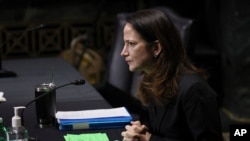The woman tapped to lead the United States intelligence agencies following four years under President Donald Trump is telling lawmakers her first task will be to restore trust, both with the American people and Washington’s key allies.
Avril Haines, a former deputy director of at the Central Intelligence Agency and a former White House aide, called reestablishing confidence in the U.S. intelligence community “perhaps the greatest challenge” facing the country’s next top intelligence official, adding it is one she is prepared to take on.
"To be effective, the DNI (director of national intelligence) must never shy away from speaking truth to power. Ever. Especially when doing so may be inconvenient or difficult," Haines told members of the Senate Intelligence Committee on Tuesday.
“The DNI must insist that when it comes to intelligence, there must be no place for politics. Ever," she said, adding she believes it is also what President-elect Joe Biden “will expect from us.”
"He will want to know what information we have that actually conflicts with his policy positions."
Haines also said that while some of her most pressing priorities involve looking inward, the new Biden administration will also need to face down a combination of traditional and evolving threats.
Evolving threats to US
Among state actors, she said, countering China will be a prime objective.
“Our approach to China has to evolve and essentially meet the reality of the particularly assertive and aggressive China that we see today,” Haines told lawmakers, suggesting Washington must adopt “an aggressive stance.”
Questioned about a possible return by the U.S. to the Iran nuclear deal, also known as the Joint Comprehensive Plan of Action, Haines urged caution.
“Frankly, we're a long ways from that," she said, adding Tehran should never be allowed to develop a nuclear arsenal.
“Iran is a threat and a destabilizing actor in the region," Haines said, noting concerns about the regime’s support of proxy actor and terror groups, as well as its advancing ballistic missile program.
"This is an issue that we need to focus in on,” she said.
Haines said other top threats include fallout from global climate change, cyberattacks, terrorism, corruption and disinformation campaigns, including those being waged by Russia and China.
And she promised that if confirmed, she would put the weight of U.S. intelligence agencies behind the effort to battle the coronavirus pandemic, “while also addressing the long-term challenge of future biological crises."
Restoring trust in US intelligence
Repeatedly, Haines’s testimony returned to the theme of restoring trust and confidence in the U.S. intelligence agencies, which for the past four years have endured an uneasy relationship with the outgoing president.
Time and again, Trump clashed with U.S. intelligence officials over their assessments, starting with their unclassified assessment that Russia and Russian President Vladimir Putin ultimately used a variety of influence operations in an attempt to help Trump emerge victorious in the 2016 U.S. presidential election.
The developing animosity even carried over into public spats between Trump and his own intelligence officials; at one point, he rebuked them on social media by saying they “should go back to school!”
More recently, critics have lashed out at Trump for appointing people they see as political partisans to key intelligence roles, a list that includes former acting DNI Richard Grennell, who had also served as ambassador to Germany, and current DNI John Ratcliffe, a former member of Congress.
In an apparent rebuke to Trump, Dan Coats, Trump’s former director of national intelligence, appeared Tuesday on Capitol Hill to personally introduce Haines, calling her an “exceptional choice” to lead the U.S. intelligence apparatus.
“Given the recent state of affairs in regard to the role and integrity of the intelligence community, Avril has a clear … recognition of the most needed responsibilities for the next director,” Coats told the panel.
"Most important to me, as a former director of national intelligence, is her commitment to bringing nonpoliticized truth to power and restoring trust and confidence in the intelligence community and the American public."
Biden, who announced his decision to nominate Haines to the top intelligence role in November, described her at the time as a “fierce advocate of telling the truth.”
In addition to Coats, other former U.S. intelligence officials have praised Biden’s selection of Haines for the key intelligence role.
“Her professionalism and competence will play well with our allies and partners overseas that rely on a robust — if secret — relationship with the intelligence community,” said John Sipher, a 28-year veteran of the CIA who once ran the spy agency's Russia operations and a frequent Trump critic.
“She will be a far better steward of the intelligence community than patently partisan and unqualified people that Trump has put in the DNI position,” he added.
Following Tuesday’s hearing, the incoming chairman of the Senate Intelligence Committee, Democratic Sen. Mark Warner, praised Haines.
“I urge the Senate to confirm her without any unnecessary delay,” Warner said in a statement.
Lawmakers indicated a vote is unlikely to come before Thursday at the earliest.




